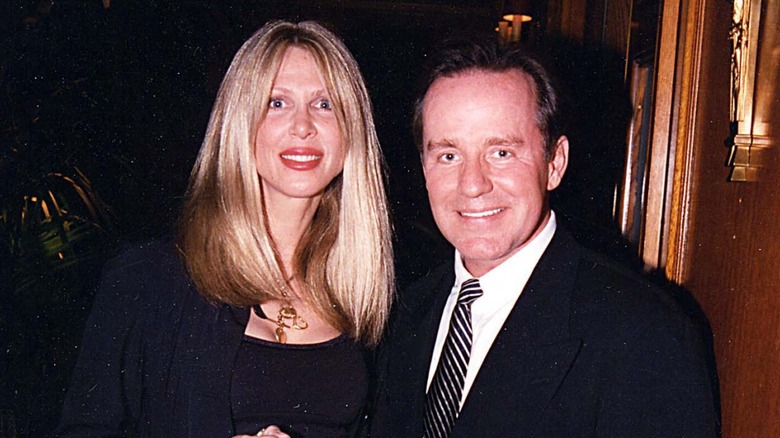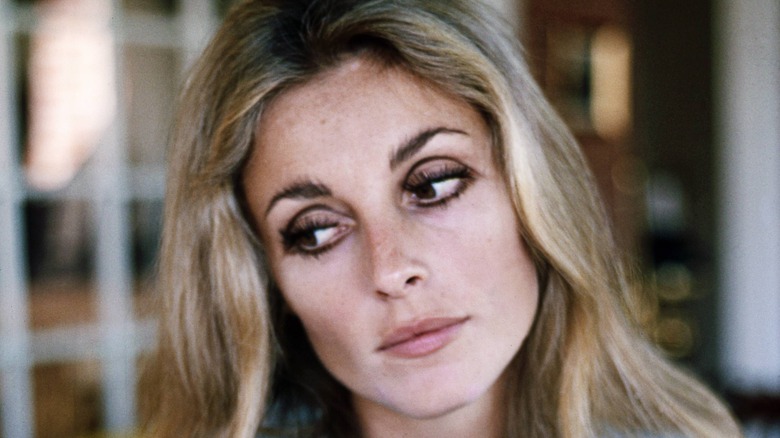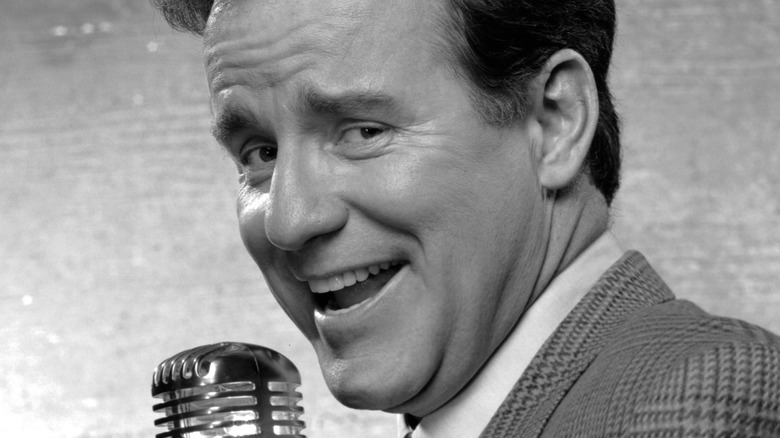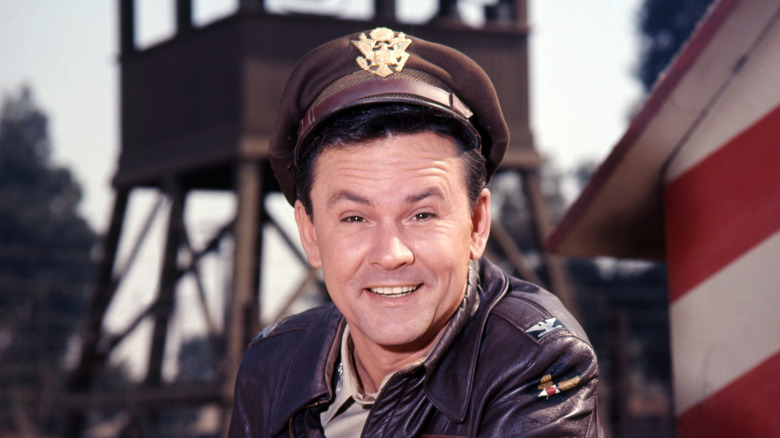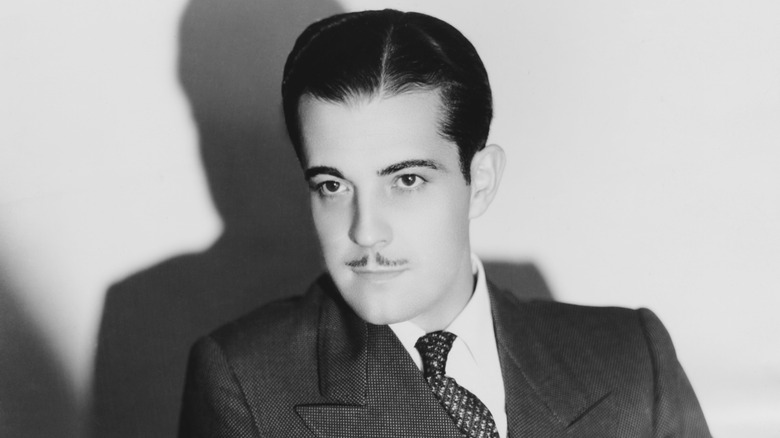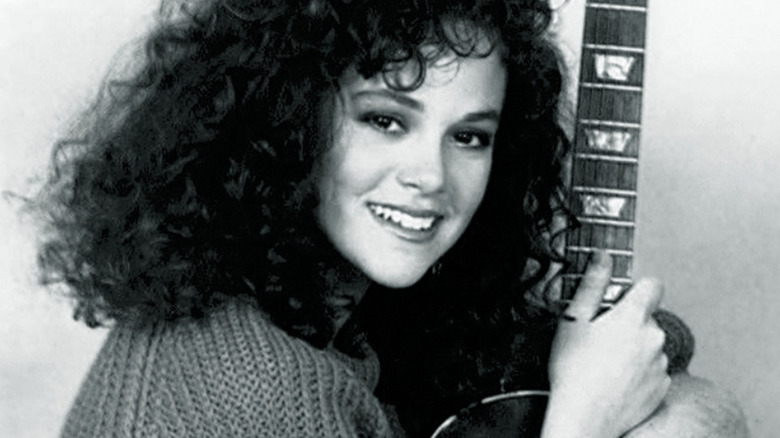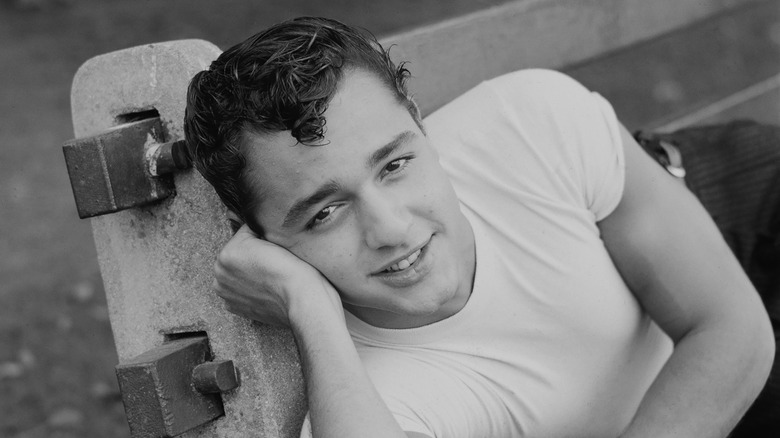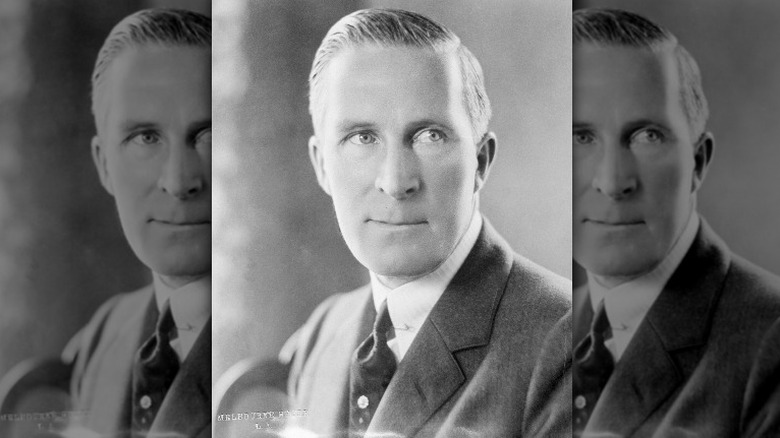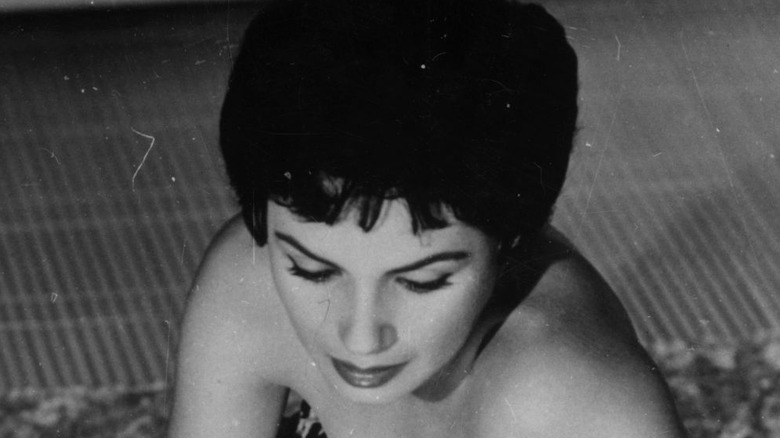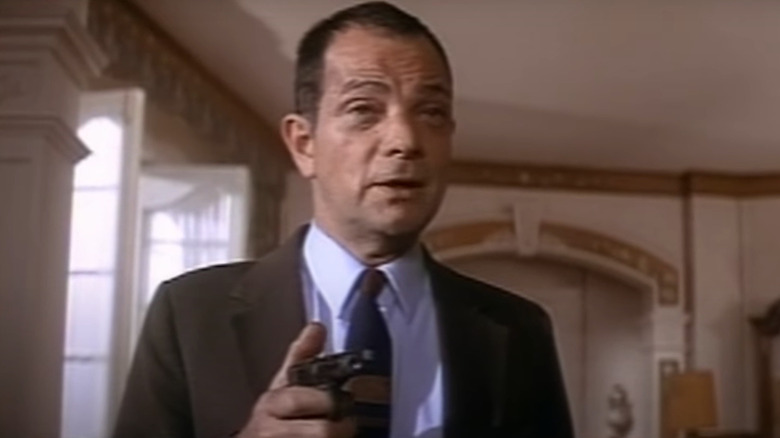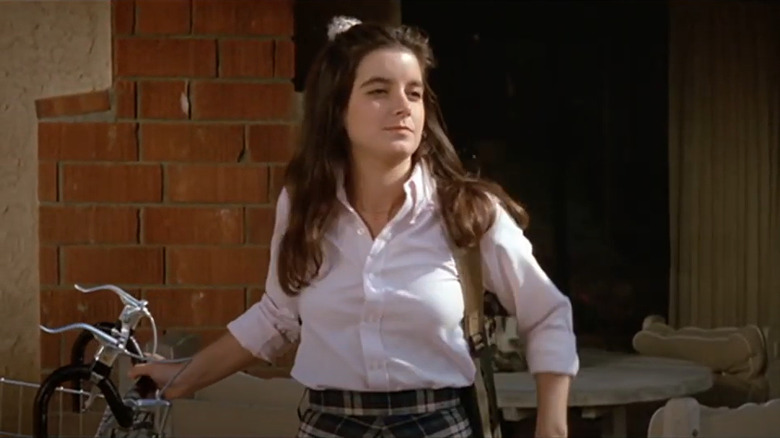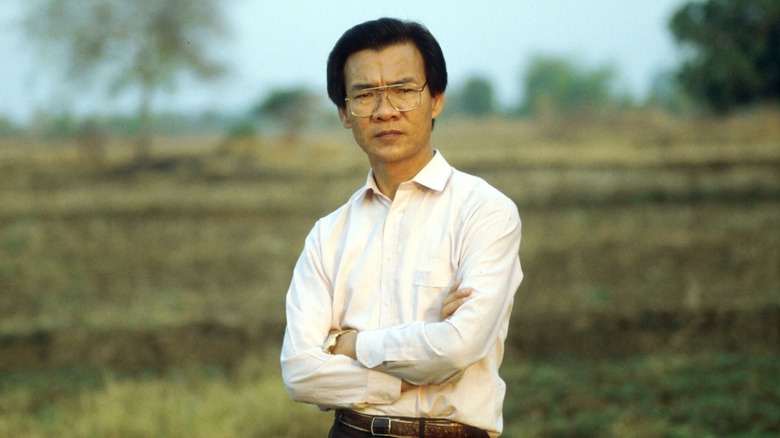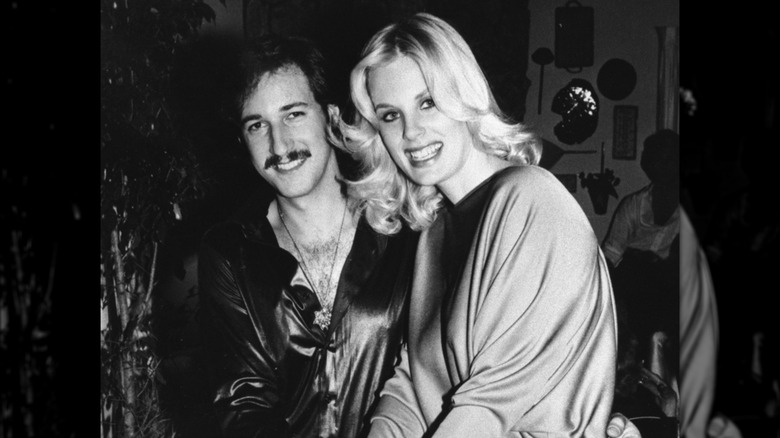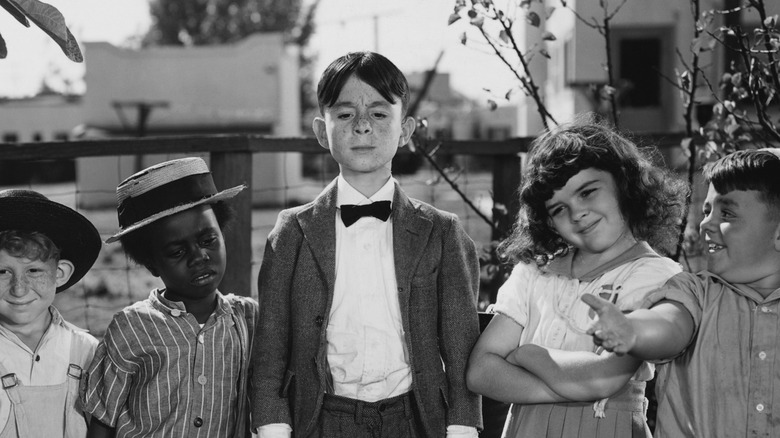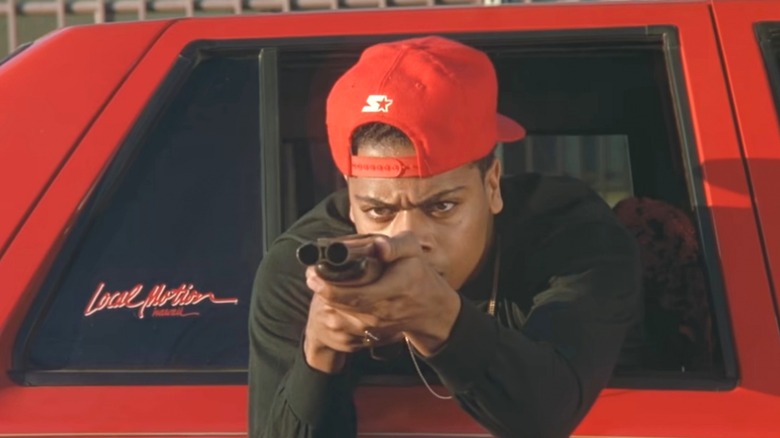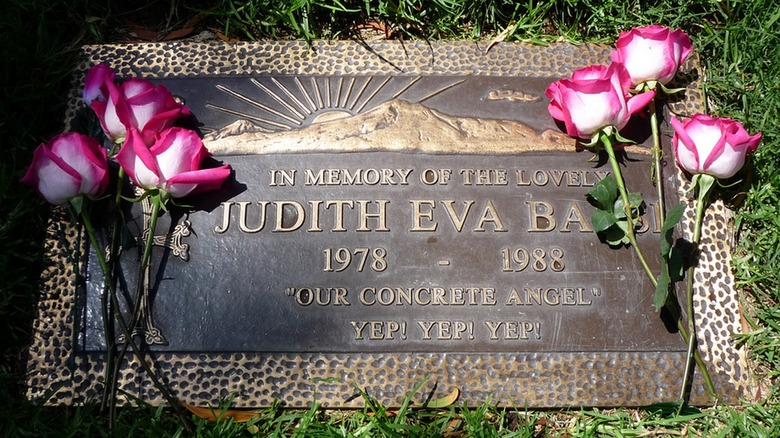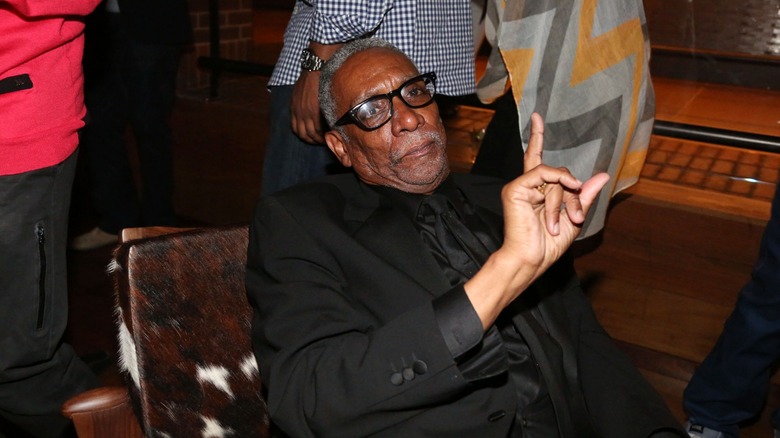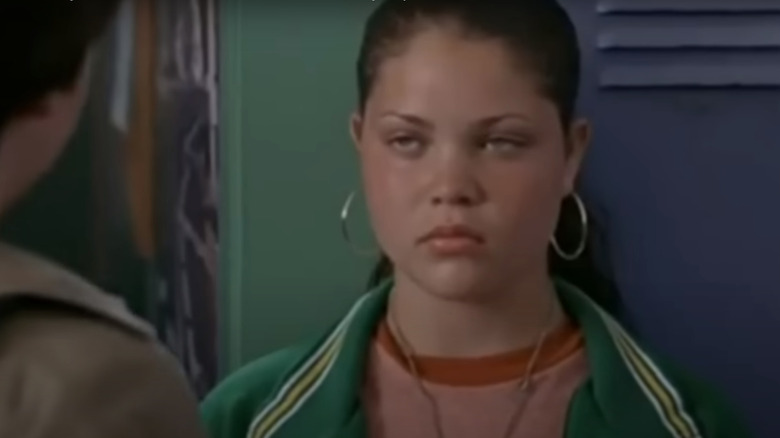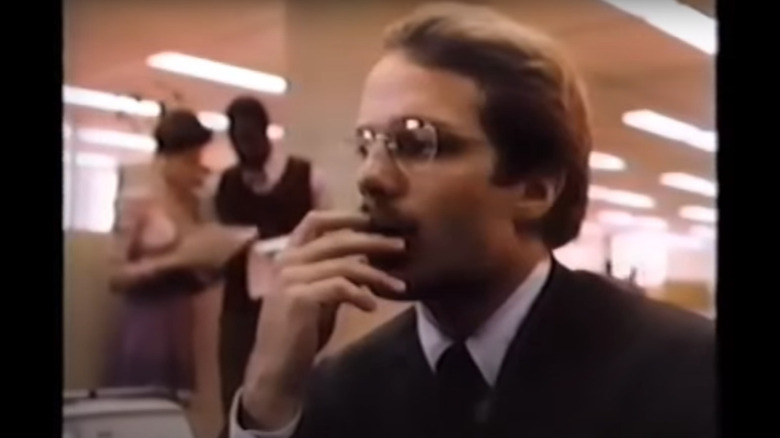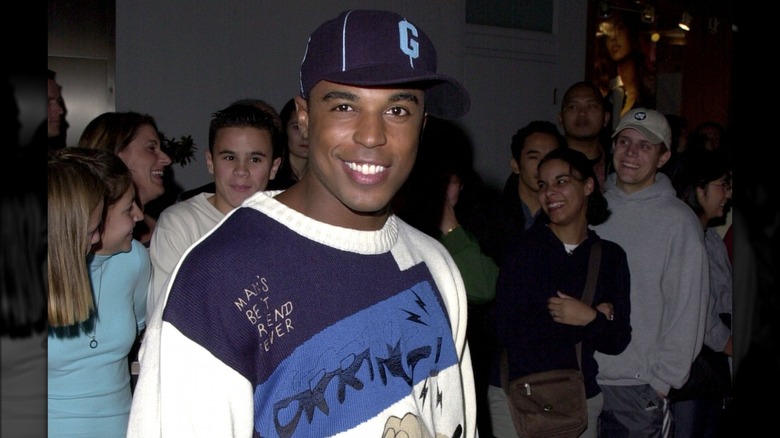Actors Who Were Tragically Murdered
One of the appeals of acting is the chance to simulate thrills and danger without actually risking one's life. With some high-profile exceptions, such as the death of Brandon Lee on the set of "The Crow" or the casualties from the helicopter accident of "The Twilight Zone," actors can regularly simulate violence and death and head home at the end of a shooting day without issue. Any danger is managed – increasingly so in later years — and for those on set, there is a clear divide between dark fantasy and the humdrum routine of everyday life.
But the make-believe nature of movies and television doesn't extend to private life. There, where there are no cameras, crew, and safety equipment, actors can fall into unlucky circumstances, dangerous relationships, and brutal encounters. Over the history of cinema, to the shock of friends and colleagues, several actors have met tragic ends at the hands of killers.
The following article includes allegations and descriptions of domestic abuse, addiction, suicide and mental health issues. If you or anyone you know needs help with these issues, help is available. Visit the Substance Abuse and Mental Health Services Administration website or contact SAMHSA's National Helpline at 1-800-662-HELP (4357). If you or someone you know is dealing with domestic abuse, you can call the National Domestic Violence Hotline at 1−800−799−7233. You can also find more information, resources, and support at their website. If you or anyone you know is having suicidal thoughts, please call the National Suicide Prevention Lifeline by dialing 988 or by calling 1-800-273-TALK (8255).
Sharon Tate
Possibly the most notorious murder committed in Hollywood history is the killing of Sharon Tate and her friends in 1969. Tate was only 26 at the time of her death, and a rising Hollywood star. Born in 1943, she was shy as a girl, but slowly made her way into acting through modeling. Her breakthrough was in 1967, when she was prominently featured in four films. Among them was "The Fearless Vampire Killers," through which she met her husband, director Roman Polanski.
Tate and Polanski were living in the home of record producer Terry Melcher in Benedict Canyon in July 1969. With Polanski away on a film shoot, a pregnant Tate shared the house with two friends. All of them, plus a visiting friend and a passing driver, were brutally murdered in the early hours of August 9. The crime scene, with victims bound together by rope and the word "PIG" written in Tate's blood on the door, was compared to a cult ritual.
While the housekeeper was initially suspected, the murders were carried out on the orders of cult leader Charles Manson. Further murders on his orders sent Los Angeles into a panic. The crimes, their most famous victim, and their mastermind have been the subject of myriad articles and documentaries since, and inspired a controversial piece of Quentin Tarantino's "Once Upon a Time in Hollywood."
Phil Hartman
Multiple TV shows valued Phil Hartman as a performer in the 1980s and 90s. After switching from graphic design (per Turner Classic Movies), Hartman broke into comedy as a member of The Groundlings and a collaborator of Paul Reubens in the creation of Pee-wee Herman. His wide range made him a fixture on "Saturday Night Live" for eight years, and he voiced several popular side characters on "The Simpsons." After leaving SNL, a star vehicle all Hartman's own came in the form of the sitcom "NewsRadio."
Behind the scenes, Hartman was popular with his peers for his fatherly manner, and perceived as a model for a successful marriage in show business. But his union with Brynn Omdahl, his third wife, was troubled. While they both reveled in being parents and remained married for over ten years, their bond was strained by Omdahl's misuse of drugs and alcohol. She sent threatening messages to one of Hartman's ex-wives, and for his part, Hartman was often away with work and could be emotionally withdrawn in the face of trouble.
Accounts vary on the state of Hartman's marriage just before the end of his life. But on May 28, 1998, he was killed in his bed by Omdahl, who was later found to have alcohol and cocaine in her system. After telling a friend what she had done, Omdahl died by suicide.
Bob Crane
Acting was Bob Crane's second choice for an artistic career; per Turner Classic Movies, he started as a drummer, but the need to support his family led him to acting via radio broadcasting. Crane's big break came through "Hogan's Heroes." While sometimes critically panned, it was a massive hit with audiences, and Crane was twice nominated as best male comedy lead at the Emmys.
The success of "Hogan's Heroes" allowed Crane to live a high lifestyle. He especially indulged his sexual appetites, leaving his wife of 20 years for an affair with his co-star Sigrid Valdis. But not long after his marital shake-up, CBS shut "Hogan's Heroes" down for being popular with the wrong demographic, and Crane started taking work as a touring stage actor. Crane regularly traded on his celebrity to pull off sexual conquests, and even began filming his bedroom exploits. He was aided by video salesman John Henry Carpenter, who sometimes joined Crane for a threesome.
Carpenter was the prime suspect when Crane was found beaten and strangled on June 29, 1978, at 49 years old. But despite circumstantial evidence pointing in his direction, no warrant was issued. Carpenter wouldn't be tried until 1994, and the evidence still wasn't enough for a conviction. He died four years later, and Crane's murder remains officially unsolved.
Jefferson Machado
On January 27, 2023, Jefferson Machado was reported missing from his home in Brazil. Originally from Santa Catarina, Machado was once a journalist, reporting on gossip for various magazines. He transitioned into show business, tackling various jobs in various rungs of the profession. TV, music videos, and live events kept him busy with production and art department duties until his break came as an actor in 2022, when he was cast in the soap opera "Reis."
Machado's family became aware he was missing when they saw the state of his eight dogs; two were dead, one was lost, and the rest were neglected. While reported lost in January, he was officially declared missing on February 9. Nearly four months later, the Machado family attorney, Jairo Magalhaes Pereira, issued a statement that Machado had been found, but the news was not good. "Preliminary information indicates that the actor's body was found in a trunk, buried in a hole of considerable depth," the statement read (via Facebook). The trunk had been covered with cement, and there were indications that Machado had been strangled.
Jeander Vinícius da Silva Braga and Bruno de Souza Rodrigues were indicted for the crime in May, however, the latter managed to stay on the lam for another two weeks before being apprehended. Their trial began in October 2023; as of this writing there has not been a verdict.
Ramón Novarro
Before Charlton Heston, Ramón Novarro was the actor identified with the role of Ben-Hur, courtesy of the silent epic "Ben-Hur: A Tale of Christ." Originally from Mexico, Novarro later became associated with great romances. In his private life, Novarro was gay, something he continually struggled to reconcile with his Catholic faith (per Turner Classic Movies). He refused studio advice to take on a sham marriage to improve his image, but he was reticent even with his closest friends to discuss his sexuality. With the coming of sound, Novarro's career declined despite his classically trained voice, and his private conflict bred a reliance on alcohol.
In his final years, Novarro was comfortable but reclusive, accepting small parts on television. He also regularly hired young men for sex, though he had a reputation as a kind, lonely man who engaged in conversation with his company before passing out without intercourse. On October 30, 1968, Novarro invited two such men into his home, brothers Tom and Paul Ferguson. The Fergusons were convinced that Novarro had a large stash of money somewhere in his house, and viciously beat him when he repeatedly (and truthfully) claimed otherwise. After 22 blows, some with a cane, the brothers left Novarro on his bed, where he choked to death on his own blood. The Fergusons were later sentenced to life in prison; both were released and reincarcerated for unrelated crimes.
Rebecca Schaeffer
Rebecca Schaeffer was a rising star in the 1980s. Her sitcom, "My Sister Sam," only lasted two seasons on CBS, but it brought her a measure of fame. She was poised to close the decade with an audition for "The Godfather Part III." But Schaeffer never had the chance to read for a part in that film. On July 18, 1989, she was murdered by a stalker. Robert John Bardo, an obsessively devoted fan of "My Sister Sam," became fixated on Schaeffer. He hired a private detective to track down her address through the DMV, engaged her in a short conversation with an autographed picture in hand, and then came back to shoot her. Schaeffer was just 21 years old.
Her death came on the heels of the murder of John Lennon and the attempted assassination of President Ronald Reagan. Being so young, and in her own doorway when she was killed, her case badly shook Hollywood. The Screen Actors Guild lobbied for new privacy laws, and those in the public eye became more aware of potential dangers and unstable fans. Bardo's trial was an early example of how the media would cover celebrity-connected trials in the 1990s. His prosecutor, Marcia Clark, went on to prosecute the O.J. Simpson case. Bardo was sentenced to life in prison in 1991, a sentence he is still serving as of 2024.
Adrienne Shelly
When Adrienne Shelly was found dead at 40 in her Manhattan office on November 1, 2006, hung from a shower rod by a sheet, her death was initially ruled a suicide. Per The Guardian, it was a reluctantly decided ruling, as footprints on the scene didn't belong to Shelly, and Shelly's husband, Andy Ostroy, refused to accept the verdict. Her career as an actress and director was gaining momentum, and she and Ostroy were raising a 2-year-old daughter at the time.
By November 8, the truth came out. Shelly had been killed by Diego Pillco, a young construction worker working in the apartment below hers. Pillco and Shelly argued over the noise he was making. When Shelly said she was calling the police, Pillco first tried to dissuade her, then restrain her. He claimed that he killed her with a punch to the head; the hung body was an attempt to escape detection by misdirection, though the prosecution maintained that Shelly showed no signs of a head injury.
Decades later, Ostroy directed a documentary on his late wife, "Adrienne," including an interview he conducted with Pillco. "The point of that interview was to get the truth of what happened that day," he told The Guardian. "And also to humanize Adrienne for him, so that ... he understood all the moments ... that Adrienne missed."
Sal Mineo
Sal Mineo caught two breaks early in his career; he understudied and later performed as the Crown Prince during the initial run of "The King and I" on stage, and he co-starred with James Dean in "Rebel Without a Cause" in 1955. The film brought Mineo legions of fans and an Oscar nomination. When Dean died tragically young, Mineo inherited his mantle of cinema's leading troubled teen. He gained experience and another Oscar nod through his collaborations with Paul Newman, but as he entered the 1960s, Mineo found good roles few and far between.
While unsatisfied with film and television projects, Mineo found a fresh challenge on the stage in 1976. He was coming home from rehearsals for a popular comedy on February 12 when he was attacked outside his apartment in West Hollywood. Eyewitnesses reported a white man with brown hair fleeing the scene, leaving Mineo with a deep stab wound he soon died from.
Initial investigations looked into Mineo's prison reform work and his private life. No arrests were made for two years, at which point delivery man Lionel Ray Williams was arrested in Michigan for bad checks. He allegedly boasted about killing Mineo, and his wife told police that Williams was bloodied that February night in 1976. But Williams was a Black man, and some observers — including Mineo's family — retained doubts about his guilt even after his conviction.
William Desmond Taylor
Born in Ireland, William Desmond Taylor — birth name William Deane-Tanner — began as an actor, but gained his greatest fame in silent cinema as a director. By 1922, he was president of the Motion Picture Directors Association. Taylor was held up by studio bosses as a champion of the film industry at a time when various groups were calling for increased censorship, seeing Hollywood as a malign force on American morality. However, Taylor's private life included numerous affairs and a wife and daughters he'd run out on, and was a well-kept secret.
Such episodes from Taylor's past came to light, and contributed to the sense of shock felt by Hollywood when Taylor was found dead on February 2, 1922, according to William J Mann's "Tinseltown: Murder, Morphine, and Madness at the Dawn of Hollywood." While initially reported as a natural death, police arrived to find the 49-year-old Taylor's body with a gunshot to the back, and a group of Hollywood notables going through his house. His murder, sandwiched between the scandalous trial of Roscoe "Fatty" Arbuckle and the drug-related death of actor Wallace Reid, intensified negative perceptions of Hollywood.
Officially, Taylor's murder remains unsolved. But suspicion has rested on Charlotte Shelby, the mother of Taylor's lover Mary Minter, who allegedly gave an implicit confession that her mother killed Taylor.
Susan Cabot
In reporting on Susan Cabot's death, the Los Angeles Times compared her to "Sunset Boulevard's" Norma Desmond. Her biggest claims to fame as an actress were a run of B-movie westerns in the 1950s and a romance with King Hussein of Jordan. But Cabot's career faded relatively quickly, and though she kept herself financially stable through real estate and car restoration, her private life deteriorated as she aged. She spent her last years as a recluse, endured episodes of mental health, and remained a controlling and erratic force in the life of her son, Timothy Scott Roman. Roman was raised in an often squalid home environment and was given several strong and controversial drugs, partly to counter his dwarfism.
On December 10, 1986, Cabot was beaten to death with a weight-lifting bar in her home, and Roman was charged with the crime. He initially maintained his innocence, claiming that a burglar wearing a ninja mask had killed his mother. But with police evidence suggesting otherwise, his defense focused on his unusual upbringing's effect on his behavior and mental health. Roman later admitted that there was no burglar, but maintained he didn't remember killing Cabot. A verdict wasn't reached until 1989; Roman was found guilty of involuntary manslaughter.
If you or someone you know needs help with mental health, please contact the Crisis Text Line by texting HOME to 741741, call the National Alliance on Mental Illness helpline at 1-800-950-NAMI (6264), or visit the National Institute of Mental Health website.
Peter Arne
There was a touch of scandal in Peter Arne's life even before he was found beaten to death on August 1, 1983 (per The New York Times). Born in modern-day Malaysia to American and Swiss-French parents, based out of the U.K. as an adult, Arne was a character actor who regularly played villains on film and TV. He also embezzled novelist Mary Renault out of thousands of dollars through a scheme to build immigrant housing in South Africa in the 1940s. Arne's escape to his home country to dodge formal charges was accomplished, in part, by stealing Renault's car.
He was more generous to Giuseppe Perusi in the 1980s. Perusi was a schoolteacher who lived in a park near Arne's Knightsbridge home. At the time of his death, Arne was providing Perusi with food. As Arne's home showed no signs of forced entry, police concluded that he had known his killer, and Perusi became the chief suspect. His body, or at least one matching his description, was found in the River Thames less than a week later. It was determined at an October inquest that Perusi died by suicide after killing Arne.
Bai Jing
Within China, Bai Jing was a popular star of action films, including "Kung Fu Wing Chun," and performed in children's plays and musicals. She was also alleged to be involved in an elaborate divorce scheme against her husband, billionaire Zhou Chenghai, who left his first wife for Bai and put a considerable sum of money behind her work (per China.org). Rumors within the Chinese film industry held that Bai was involved with a triad figure, and that the two of them robbed Zhou of ¥20 million. To get even more out of Zhou, the pair were said to have hired a prostitute to seduce him, giving Bai grounds for a large divorce settlement. Such schemes were blamed for the death of Zhou's mother.
Those who knew and worked with Bai disavowed the rumors, but it wasn't disputed that Bai and Zhou were in an unhappy relationship marked by fighting. For her part, Bai reportedly told friends that Zhou was unfaithful and abusive. The marriage tragically ended on February 28, 2012, when Zhou stabbed Bai to death in their home before killing himself. Bai's colleagues were shocked, but domestic abuse is a widespread issue in China; per Week in China, up to a quarter of women suffered abuse around the time of Bai's death.
Dominique Dunne
Dominique Dunne was born into an artistic family. Two noted novelists were ancestors, her father Dominick was a producer and journalist, and her brother Griffin was an actor. Dominique followed suit after high school: Starting in TV, she then jumped into the movies with a noted part in "Poltergeist." Shortly before taking her part in the film, Dominique fell into a relationship with chef John Thomas Sweeney. He was insecure, jealous, and physically abusive; per Turner Classic Movies, one assault left Dominique with visible bruises on her neck in her final TV appearance.
Dominique broke up with Sweeney after that incident, but while rehearsing at her home on October 30, 1982, she was visited by her ex-boyfriend, who dragged her outside and began strangling her when she wouldn't take him back. Fellow actor David Packer, who was rehearsing with Dominique, stayed inside and set up his alibi before calling the police. By the time he went outside, Sweeney had been choking Dominique for five minutes. She fell into a coma and died five days later.
At trial, Sweeney's history of domestic violence was withheld as evidence by the judge, and he was ultimately convicted of voluntary manslaughter, with a maximum sentence of six years; he was released in less than three. Dominique's outraged family organized a negative publicity campaign to drive him out of his chef's job, and eventually, out of Hollywood.
Dr. Haing Ngor
For those who are unfamiliar, the story of Dr. Haing S. Ngor is one of the most inspiring, and tragic, in Hollywood history. Born in 1940 in Samrong Young, Cambodia, Ngor was a trained doctor who was unfortunate enough to live through the horrific reign of despot Pol Pot. Pol Pot was the leader of the radical communist Khmer Rouge government that was in power in Cambodia in the late 1970s, and he was largely responsible for the Cambodian genocide that killed as many as 2 million people.
During the genocide, Ngor lived in a forced labor camp, where he was tortured and lost both his wife and unborn child. Ngor eventually escaped Cambodia and made his way to the United States, but the experiences traumatized him. Once in the U.S., Ngor was cast in the movie "The Killing Fields," which takes place amidst the Cambodian genocide he had endured in real life. He was cast as a Cambodian-American reporter Dith Pran and won an Oscar for his outstanding performance.
Sadly, Ngor was killed on February 25, 1996, while he was parked in his car outside of his home. Authorities found him shot to death by three members of the Oriental LazyBoyz street gang, who were all later given life sentences in prison. The killers were all in their early 20s and also from Cambodia, like Ngor, and were convicted of both robbery and murder in his death.
Lana Clarkson
Lana Clarkson was a 40-year-old actor who was shockingly murdered by once-famous record producer Phil Spector in 2003. While she was not a huge draw during her career, she still had notable roles in a few films, including "Barbarian Queen," "Fast Times at Ridgemont High," and the TV show "Night Court," but her last credit was in 2001 a few years before her death.
Clark and Spector had met on the night of February 2, 2003, while out, and she voluntarily accompanied him to his house in Alhambra, California. According to prosecutors in Spector's murder trial, Clarkson spurned Spector's sexual advances early the next morning on February 3rd, which upset Spector so much that he shot her to death — though Spector claimed that she had died by suicide and denied shooting her. However, immediately after killing Clarkson, Spector reportedly left the house and confessed the murder to his driver, who would later relay his words to police.
Police arrested Spector the night after the murder and he was indicted, but he was able to get out on $1 million bail while he was awaiting trial. Twenty months later, prosecutors charged Spector with murder, but the first trial ended in a hung jury when they could not get a conviction. Upon retrial, the 69-year-old Spector was convicted of murder and given a sentence of 19 years to life in prison. Spector himself later died at age 81 on January 16, 2021, while still incarcerated in a California state prison.
Dorothy Stratten
When Dorothy Stratten was murdered on August 14, 1980, her career in Hollywood had just started to get underway. Born on February 28, 1960, Stratten was killed by her estranged husband Paul Snider, who had been the one initially responsible for launching Stratten's success by getting her signed by Playboy when she was just 18. Originally from Canada, the couple moved to Los Angeles to pursue her modeling career, and by all accounts, Stratten was an incredibly charming and lovely young woman, but the same could not be said about Snider, who often rubbed others the wrong way.
The two got married in June 1979 just before she hit her big break, but there was already trouble in the relationship. Stratten felt dependent on Snider, but he displayed misogynistic tendencies and appeared to be unfaithful to her. Eventually, the two started to move apart as Stratten began to excel in the acting world, which upset Snider greatly. Soon, Stratten was living with filmmaker Peter Bogdanovich, who had written her into a movie he was making called "They All Laughed," which would be released after her death.
While they were separated, Stratten agreed to meet with Snider at his house to work out a divorce agreement. However, Snider instead raped and murdered Stratten when she came over before dying by suicide himself. Both Bogdanovich and Playboy head Hugh Hefner were devastated by the murder, and she was only 20 years old at the time of her death.
Christina Grimmie
On June 10, 2016, the world was shocked by the news of the murder of singer and actor Christina Grimmie. Grimmie had shot to fame by singing on her popular YouTube channel and appearing on the reality TV competition show "The Voice," where she came in third. She had also just acted in her first feature film "The Matchbreaker," which was released just a few months after her death.
Grimmie was in the middle of an autograph signing when she was murdered by 27-year-old Kevin James Loibl in front of a group of fans and bystanders. She had just performed a set of music immediately prior to the autograph session at a venue called The Plaza Live in Orlando, though it's unclear if Loibl saw the show or if he was even a fan of hers. Loibl died by suicide after he was tackled by Grimmie's brother following the shooting, and police found more weapons and ammunition on him afterward.
Grimmie was only 22 years old when she was murdered and had her entire career ahead of her. After her death, her brother Marcus Grimmie, the one who tackled the shooter, started the Christina Grimmie Foundation in her honor, which helps victims of gun violence. No motive was ever determined for the slaying.
Carl Switzer
Carl Switzer was tragically gunned down on January 21, 1959, by a friend of his named Moses "Bud" Stiltz. Switzer and Stiltz were partners who owned a bear hunting guide business together, but had a falling out over financial issues (according to Associated Press). Switzer thought that Stiltz owed him money and confronted him at a California home, and the two ended up fighting over a pistol, which went off and killed Switzer. Switzer's friend Jack Pilott had also accompanied him there, but he does not appear to have been injured.
According to the Los Angeles Evening Mirror News, Switzer lost a dog owned by Stiltz and ended up paying a $50 reward to the person that found the animal. In return, Switzer believed Stiltz should have refunded him the amount. The two were both under the influence of alcohol at the time of the shooting, and there was no word on what happened to Switzer's dog after his death. Though Stiltz was arrested by police and was charged with Switzer's death, he was acquitted of self-defense as it was ruled a justifiable homicide under California law by a jury.
Switzer had come to prominence in Hollywood as a child actor, appearing as the beloved character Alfalfa in the comedy short series "Our Gang" from the 1930s-1940s. After growing older, Switzer continued his career in Hollywood, wracking up well over 100 credits by the time of his death at the age of just 31.
Stephanie Moseley
While Stephanie Moseley might not have been the biggest star, she was still fairly well-known and popular in Hollywood when she was shockingly murdered on December 8, 2014, by her husband rapper Earl Hayes. Police came over to investigate the shooting after getting a call from a neighbor who said that he'd heard around a dozen shots fired early in the morning in their apartment. Both were reportedly dead by the time the SWAT team showed up, and it appeared as though Hayes had killed Moseley before dying by suicide himself.
While it wasn't entirely clear what Hayes' motive was for killing Moseley, the couple had recently been separated, potentially over infidelity, though they were trying to work things out and get back together. Moseley was appearing on the show "Hit the Floor" on VH1 when she died.
Moseley's credits mainly included doing dance and choreography work for singers like Beyonce and Britney Spears, but she also had more than a dozen acting credits, including a role as a cheerleader on Ashely Tisdale's show "Hellcats." Acting since 2003, Moseley was 30 years old when she died and Hayes was 34.
Marie Trintignant
When Bertrand Cantat released his new album in the Fall of 2013 there was some pretty understandable outrage, but it had absolutely nothing to do with Cantat's musical abilities. Ten years prior, on August 1, 2003, Cantat had beaten his former mistress, French actor Marie Trintignant, to death in a fit of rage. The two were staying in Lithuania, and authorities detained Cantat after Trintignant was found severely injured and in a coma.
At the time, Cantat was the lead singer for the French band Noir Désir, but he initially denied doing anything. The couple had gotten into a fight on July 27, and Trintignant was in a coma for nearly a week before she passed away on August 1st. On March 29, 2004, Cantat was convicted of killing Trintignant and sentenced to eight years in prison, and he admitted to hitting her at least four times during the trial. However, Cantat was released from prison on parole in October 2007 after serving less than half of his sentence.
The reason that the couple were in Lithuania was because she was filming a movie with her mother Nadine Trintignant, who was a director. Nadine was also at the hotel when her daughter was killed, along with one of Marie's sons. Marie was 41 years old at the time of her death, and Cantat was 39 when he killed her; she had been very popular as an actor, having won multiple awards for her performances.
Lloyd Avery II
When Lloyd Avery II shot Annette Lewis and Percy Branch on July 1, 1999, he set off a chain of events that would not only take Lewis and Branch's lives but would also in a roundabout way eventually rob him of his own. Avery had been a somewhat successful actor prior to the double-murders of Lewis and Branch, even appearing in the ghetto classic "Boyz N the Hood" in 1991 playing the pivotal role of the gang member who killed protagonist Ricky Baker.
However, even though he found some success in acting, Avery ended up becoming affiliated with the Bloods street gang, coincidentally the same gang he portrayed being a member of in the film (via the Chicago Defender). This led to the killing of Lewis and Branch over an alleged drug debt, which landed Avery a life sentence in prison. While in prison, Avery had the unfortunate luck of becoming the cellmate of one Kevin Roby, a sadistic killer who was already serving life for the rape and murder of his own sister. Avery was an evangelical Christian while Roby worshiped Satan, and Roby murdered Avery in their cell on September 4, 2005, for trying to proselytize.
Avery died of blunt force trauma and aspiration of blood after being beaten and choked, and Roby announced his death to prison officials by painting the walls red with Avery's blood and putting his body on a pentagram on the floor. Avery was 36 years old when he died.
Judith Barsi
The horrific death of Judith Barsi is still difficult to read nearly four decades later. Judith was a child actor who by the time of her death at age 10 already had an impressive 25 acting credits to her name. This included her role as Thea in "Jaws IV: Revenge," and she also starred in 72 commercials, helping her to bring in a six-figure salary at her young age (via the L.A. Times).
However, there was also a dark side to Judith, and it was her relationship with her abusive father. For years leading up to her death, Judith's father Jozsef Barsi had threatened to kill her and her mother, by one friend's count saying so at least 500 times. Jozsef was also physically abusive to Judith, at one point buying her a pink TV set after aggressively pulling her hair and hurting her. Jozsef was a Hungarian plumber and he killed both Judith and his wife Maria Barsi.
Jozsef and Maria had fled the Soviet Union in the 1950s to settle in Los Angeles, but the couple's relationship had begun to sour, partly over Jozsef's drinking, which may have led to the killings. They had separated after she filed a police report in 1986 alleging abuse and verbal threats, though no legal action was taken against him. According to police, Jozsef shot both Judith and Maria before burning their bodies and dying himself by suicide at their home in San Fernando, California.
Thomas Jefferson Byrd
Though he got a late start to his acting career, Thomas Jefferson Byrd was a widely respected and admired actor when he was shot to death at age 70 on October 3, 2020. Born in 1950, Byrd did not get his start in the acting industry until he was already in his early 40s, but he finished his career with more than 30 credits. This included a number of Spike Lee movies such as "Clockers," "He Got Game," "Red Hook Summer," "Chi-Raq," and most recently, Lee's 2017–2019 TV series "She's Gotta Have It." He was also a Tony Award nominee one time in 2003.
The circumstances surrounding Byrd's death are still somewhat of a mystery, but he was found dead by police of multiple gunshot wounds early in the morning on October 3rd. Witnesses suggested that the killing may have been over an argument that Byrd allegedly got into at a local store, but the police did not confirm anything. A break in the case came a few weeks later on October 16, when a 30-year-old man Antonio Demetrice Rhynes was arrested in connection with Byrd's death. He was charged with felony murder after allegedly shooting Boyd in the back multiple times.
Byrd's memorial service was streamed online so people everywhere could attend, and Lee posted a tribute to Byrd on his Instagram. Court records show Rhynes was later convicted of aggravated assault and sentenced to 20 years in Georgia prison.
Tara Correa-McMullen
Young actor Tara Correa-McMullen's life was tragically cut short on October 29, 2005, when she was just 16 years old. That day, Correa-McMullen was in Inglewood, California at a friend's apartment complex when she was killed during a terrible shooting. Though Correa-McMullen was not alleged to have been involved in any gang activity herself, a couple of gang members shot her and two of her friends with a handgun as they were standing outside.
The following March, Damien Watts and a co-conspirator were charged with the murder of Correa-McMullen and the attempted murder of her two friends, who both survived the shooting. Incredibly, these were not the only shootings that Watts was being charged with, as he seemed to have gone on a vicious killing spree that week. Watts would later be convicted on January 23, 2009, of her murder, and a month later on February 27, he was sentenced to consecutive life terms — the conviction of which was later upheld on appeal (via People v. Watts).
Somewhat ironically, Correa-McMullen's big break came in her role on the show "Judging Amy," where she played an ex-gang member who was herself involved in a drive-by shooting. She also was on a show called "Rebound" with Martin Lawrence, but had struggled with reliability in recent months and had been dropped by her talent agency just prior to her death.
David Huffman
On February 27, 1985, prominent TV actor David Huffman was stabbed to death by a 16-year-old after attempting to stop a car burglary. The teenager, Genaro Samano Villanueva, was breaking into vans near where Huffman had been parked and was playing his bagpipes. After hearing a commotion, Huffman was told that Villanueva had broken into a motorhome, and he drove after Villanueva trying to stop and detain him.
However, once he reached the young teen, Villanueva and Huffman got into a struggle, and it ended with Villanueva fatally stabbing Huffman twice. Despite their difference in age, the 39-year-old Huffman was only a little bit bigger than the 16-year-old Villanueva, and it was not Villanueva's first run-in with the law. Villanueva was also an undocumented immigrant from Mexico and had only been in the country for a few months at the time of the murder, and he also did not speak any English. Later, Villanueva was given a 26-year-to-life sentence on June 3, 1986, for Huffman's murder.
In 2011, the San Diego District Attorney reported that Villanueva had been denied parole and would not be eligible again until 2026. Huffman had begun his acting career back in 1973, and he mainly worked on TV, though he was also in a few movies, most notably "Firefox" in 1982 and "St. Helens" in 1981.
Merlin Santana
Just as he was primed for his breakout, Merlin Santana was tragically murdered in South Central Los Angeles. Born in 1976, Santana was most widely known for his starring role on "The Steve Harvey Show," where he played Romeo Santana for 122 episodes from 1996–2002. He had also obtained roles on huge shows like "Moesha," "NYPD Blue," and "Getting By," and he had recently started making the jump from TV to movies.
Sadly, that was all cut short on November 9, 2002, when he was shot to death while sitting in a car with his friend. The circumstances surrounding his death are bizarre, and they involve a 15-year-old runaway named Monique King. Apparently, Santana and King were at a house that night when for some inexplicable reason King decided to make up a lie that Santana and one of his friends had made unwanted sexual advances on her. She left the house and got two of her older friends, who then came back and shot Santana while he was in the car.
Though they fled the police quickly apprehended them, and the killer Damien Andre Gates was eventually sentenced to 70 years to life in prison. King herself was remanded into the California Youth Authority's custody for eight years until she turned 25 (she was 17 when she was finally convicted), and the other accomplice Brandon Douglas Bynes received a 23-year sentence. Santana was only 26 years old at the time of the shooting.
